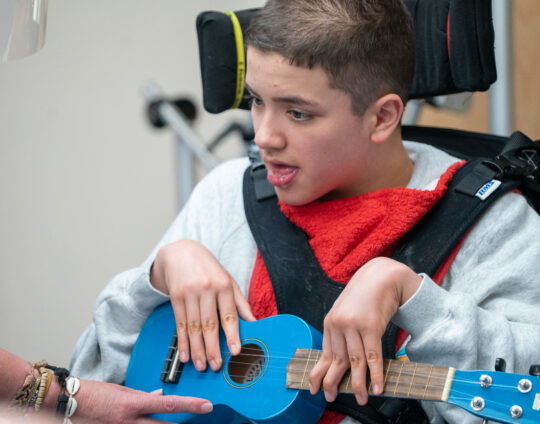Music Therapy

Music Therapy
The Need
Children and young people’s mental health has never been so high on the public agenda. A combination of increased demand for secondary children’s mental health services and ongoing pressure on NHS budgets has led to a crisis in child and adolescent mental health services (CAMHS) resulting in many young people not receiving the urgent support they need. This has led to organisations like ours taking on an ever increasing and important role in helping protect and promote student mental wellbeing.
As a result of their motor delay or disorder, our children may find it more difficult to move, engage in play, communicate, eat, drink, dress, draw, write, use technology, access the school curriculum, socialise and develop independence. Some children in our services have visual and/or hearing impairments; they may also have medical and orthopaedic needs because of their condition.
Communication is vital for participation in the world at large; socially, culturally & academically, however for Pace children it is often a huge challenge for them to develop the skills they need to understand and be understood. Children with chronic disorders that impair their motor abilities and independence are at a heightened risk of poor mental health and wellbeing. Depression rates are three to four times higher for people with disabilities, when compared to non-disabled people.
Our young people need resilience and self-esteem in buckets to make it through this time without developing mental health difficulties. Through the power of Music Therapy, we can encourage them to find their own voice, and give them a positive, can-do safe environment that enables, rather than disables, but we know that when they leave school and enter adult services things can be very different.
Music Therapy does not attract statutory funding and Pace must raise the funds required to sustain and develop the project each year through its rolling fundraising programme.
Outcomes
Music Therapy can help a child express emotion without using words and feelings that might be difficult or impossible to talk about. Communicating through music, non-verbally and spontaneously can lead to positive development of relationships, encourages self-expression, communication and language skills, and enhances wellbeing, thereby also promoting improved access to learning – all benefits the child or young person can take with them into their daily lives. It can also help physically, for example, with co-ordination skills.
Similarly,group music therapy can help members communicate with each other, to listen and to share. It may help develop a greater awareness of themselves in relation to others, and to reduce feelings of isolation and loneliness.
